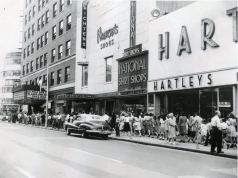John F. Kennedy once said he believed in an America where the separation of church and state was absolute, where no Catholic, Christian or member of the clergy would tell the president how to act and no minister would tell his parishioners how and for whom to vote.
For the most part, America has lived up to this idea, and in 1954 Lyndon B. Johnson helped pass the Johnson Amendment, which prohibited non-profit organizations such as universities and churches from endorsing or opposing political candidates.
President Trump has endeavored to repeal this act, believing that Christians should be able to express themselves freely without any retribution. In 2017, he signed an executive order aimed at “giving churches their voices back” by allowing them to participate in electoral contests. While the act doesn’t necessarily change the law, it gives churches more confidence in being partisan.
Many Christians believe it’s axiomatic that the United States of America was founded as a Christian nation. Yet, the constitution makes no mention of God. The Declaration of Independence includes only two mentions: “the Laws of Nature and Nature’s God,” and the famous line about men being “endowed by their Creator with certain inalienable rights.”
“In God, we trust” was coined after the Civil War and “Under God” was introduced into the pledge of allegiance amidst the hysteria of Mccarthyism. Both of these were introduced in tumultuous times for Americans who might have sought solace in religion.
Retired pastor and author Charlie Drew believes that the United States was not founded as a Christian nation per se. “I think that’s bad history,” he said. “Some of the people that framed the constitution were Christians, but some of them were deist. Thomas Jefferson was a deist. Nevertheless, there was a kind of Protestant consensus at the beginning of our country,” he said.
“Christians should be free to do that as long as they don’t assume they have priority of place in the American political experiment. That’s the mistake and they shoot themselves in the foot because the history of the church’s priority of place in the past has led to a reaction against it.”
Drew has spent his entire pastoral career attempting to cultivate a sense of community in churches despite political differences. He founded and retired from the Emmanuel Presbyterian Church in New York City and has published “Body Broken: Can Republicans and Democrats Sit in the Same Pew?” and, most recently, “Surprised by Community: Republicans and Democrats in the Same Pew”.
Drew said he felt pressure from both sides at his church to either talk about political issues or remain silent. As a pastor, he felt an obligation to serve his congregants’ needs and finally concluded that it was necessary to speak on these topics not only in a bipartisan manner, but in a gospel manner. Every election year, his church held workshops for parishioners on how to be politically engaged and also not hate each other in the process.
At a recent event at the Hebrew Tabernacle in New York titled “Talking about Politics at Church with Charlie Drew,” he used his most recent book as a guide to starting a discussion among churches about politics. He began with subtle jokes about how people run for the hills as soon as they hear the slightest mention of politics in church, eliciting stifled laughter from the crowd.
The prospect of speaking about politics in a church is an uncomfortable one, but one that needs to happen, according to Drew.
“The rest of the culture is so polarized. I think the church has a kind of wonderful missional opportunity in our present climate to be what I call a sociological surprise — in other words, a community is honest with each other but also safe with each other and therefore is a kind of community that a sociologist can’t easily explain or a political pundit can’t easily explain,” said Drew.
“I think churches are so partisan either on the left or the right, that a sociologist can look at a church and say, ‘I know exactly why it’s this way.’ If it’s an urban Black church it will be democrat, if it’s a suburban white church it’ll tend to be republican. . . politics has become kind of like a god, it’s become as important as God.”
At the seminar, people were broken up into groups by political background and asked to do a series of exercises in which they would be challenged to listen to one another without letting the conversation become a heated debate.
Dew Lizardi, a democrat and a community organizer for the Hebrew Tabernacle Church, particularly liked the discussion of moral principles versus political strategies. “It doesn’t matter for me — the candidate or the political position. Is the person moral? Are they going to follow a moral principle or is it a political strategy?” said Lizardi.
Drew characterizes political strategies as human efforts to nudge the culture in the direction of greater conformity in moral priorities, exemplified by principles such as the ten commandments.
Lizardi recalls people voting for Trump in the 2016 presidential election because he was a Christian. She believes that no matter what a candidate’s religious affiliation is, political experience should take priority. Even though she doesn’t agree with both Trump’s moral principles or political strategies, she wanted to learn how to be more tolerant of those with opposing views.
“How can I find a commonality? How can I agree to disagree and still be in unity with maybe Republicans, Democrats, liberals, all these different positions,” said Lizardi.
“My disturbance is that a lot of Christians say we have to vote for Trump because he’s the one that’s for us. So I’m so grateful for this workshop because that’s going to help me to have patience and understanding for somebody else’s view.”
Sean Dedier is a clinical coordinator for a substance abuse program and part of the church ministry. “I thought that it was an extremely necessary event. I agree with Charlie in respect to a lot of times politics is something that Christians want to stay away from. The falsehood of separation of church and state that actually doesn’t exist in our constitution is a lie that has taken on a life of its own,” said Dedier.
“It was six of us at the table and at no point in time were we all on the same page. We had different views of the topics, but we were mindful of it being gospel-driven.”
Guides authored by Drew – in which he gives reasons Christians shouldn’t be afraid to speak in the political sphere, using bible passages as context – were handed out to participants.
Some questions in the guides were: Should we seek to put our moral values into law? Should we support certain candidates because they represent the “lesser of two evils,” even if we don’t completely agree with their views?, What value should I give to a candidate’s faith in the campaigning and election process?, and How do we graciously and respectfully engage in political conversations with friends who ignore spiritual realities?
The questions were followed by biblical passages intended to help Christians frame the political issues in a context they understand and accept. The guide ended with a section labeled “Reflection on Climate Change and Christian Responsibility,” again using bible passages as context, such as God loving and caring for the land he created, but also including graphs and data to support the assertion and reinforce the importance of climate change.
“The event is about helping churches to be two things at the same time: to be engaged with social and political concerns in the world and not fighting with each other on the inevitable differences of opinion as to how to be engaged,” said Drew.
“I don’t think the church is doing a good job at [either] of those things. It’s either involved, but partisan, or it’s not involved at all. So the trick is, how can you be involved but not be [as polarized as] the rest of the culture?”
































